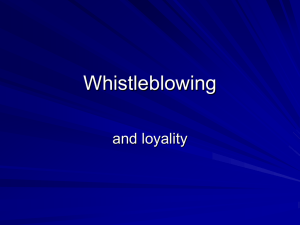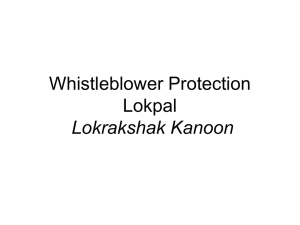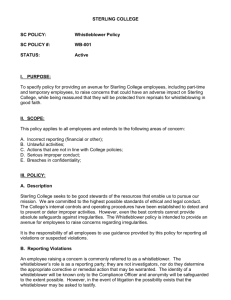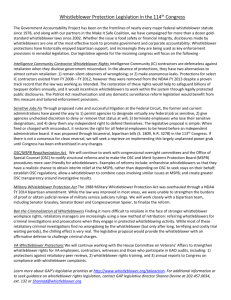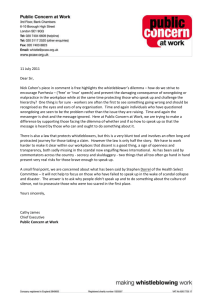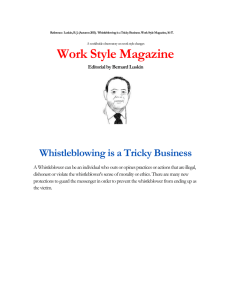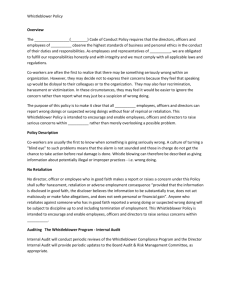Implications of the SEC's Whistleblower Rules for Attorneys, Their
advertisement
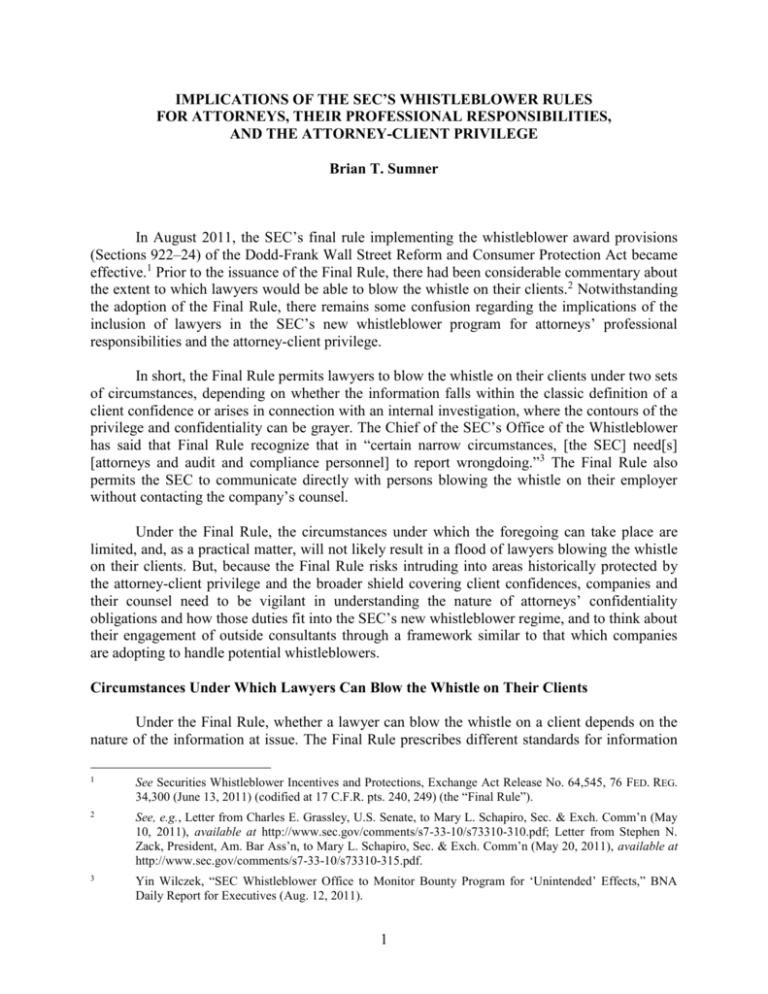
IMPLICATIONS OF THE SEC’S WHISTLEBLOWER RULES FOR ATTORNEYS, THEIR PROFESSIONAL RESPONSIBILITIES, AND THE ATTORNEY-CLIENT PRIVILEGE Brian T. Sumner In August 2011, the SEC’s final rule implementing the whistleblower award provisions (Sections 922–24) of the Dodd-Frank Wall Street Reform and Consumer Protection Act became effective.1 Prior to the issuance of the Final Rule, there had been considerable commentary about the extent to which lawyers would be able to blow the whistle on their clients.2 Notwithstanding the adoption of the Final Rule, there remains some confusion regarding the implications of the inclusion of lawyers in the SEC’s new whistleblower program for attorneys’ professional responsibilities and the attorney-client privilege. In short, the Final Rule permits lawyers to blow the whistle on their clients under two sets of circumstances, depending on whether the information falls within the classic definition of a client confidence or arises in connection with an internal investigation, where the contours of the privilege and confidentiality can be grayer. The Chief of the SEC’s Office of the Whistleblower has said that Final Rule recognize that in “certain narrow circumstances, [the SEC] need[s] [attorneys and audit and compliance personnel] to report wrongdoing.”3 The Final Rule also permits the SEC to communicate directly with persons blowing the whistle on their employer without contacting the company’s counsel. Under the Final Rule, the circumstances under which the foregoing can take place are limited, and, as a practical matter, will not likely result in a flood of lawyers blowing the whistle on their clients. But, because the Final Rule risks intruding into areas historically protected by the attorney-client privilege and the broader shield covering client confidences, companies and their counsel need to be vigilant in understanding the nature of attorneys’ confidentiality obligations and how those duties fit into the SEC’s new whistleblower regime, and to think about their engagement of outside consultants through a framework similar to that which companies are adopting to handle potential whistleblowers. Circumstances Under Which Lawyers Can Blow the Whistle on Their Clients Under the Final Rule, whether a lawyer can blow the whistle on a client depends on the nature of the information at issue. The Final Rule prescribes different standards for information 1 See Securities Whistleblower Incentives and Protections, Exchange Act Release No. 64,545, 76 FED. REG. 34,300 (June 13, 2011) (codified at 17 C.F.R. pts. 240, 249) (the “Final Rule”). 2 See, e.g., Letter from Charles E. Grassley, U.S. Senate, to Mary L. Schapiro, Sec. & Exch. Comm’n (May 10, 2011), available at http://www.sec.gov/comments/s7-33-10/s73310-310.pdf; Letter from Stephen N. Zack, President, Am. Bar Ass’n, to Mary L. Schapiro, Sec. & Exch. Comm’n (May 20, 2011), available at http://www.sec.gov/comments/s7-33-10/s73310-315.pdf. 3 Yin Wilczek, “SEC Whistleblower Office to Monitor Bounty Program for ‘Unintended’ Effects,” BNA Daily Report for Executives (Aug. 12, 2011). 1 subject to the attorney-client privilege or obtained in connection with a legal representation, on the one hand, and information obtained pursuant to inquiries and investigations by counsel, on the other. First, information that is obtained “through a communication that was subject to the attorney-client privilege” or “in connection with the legal representation of a client on whose behalf [the whistleblower] or [the whistleblower’s] employer or firm [is] providing services, and [the whistleblower] seek[s] to use the information to make a whistleblower submission for [his or her] own benefit” is not “original information”—and is therefore ineligible for a whistleblower award—unless disclosure “would otherwise be permitted by an attorney pursuant to Section 205.3(d)(2) of this chapter, the applicable state attorney conduct rules, or otherwise.”4 The Commission stated that the limited exceptions to the exclusion of privileged information “send a clear, important signal to attorneys, clients, and others that there will be no prospect of financial benefit for submitting information in violation of an attorney’s ethical obligations.”5 The circumstances under which lawyers may disclose client confidences are narrow under state bar ethics rules: most jurisdictions have adopted a variation of the crime-fraud exception found in ABA Model Rule of Professional Conduct 1.6. The issue with the Final Rule’s exception to the exclusion of privileged information and client confidences arises in connection with the SEC’s standards of conduct for attorneys, which are codified at 17 C.F.R. § 205 and govern attorneys appearing and practicing before the Commission on behalf of an issuer, and the tension between Part 205 and state ethics rules.6 Specifically, Section 205(d)(2) states that an attorney may reveal client confidences to the Commission “to the extent the attorney reasonably believes necessary” under the following circumstances: (i) To prevent the issuer from committing a material violation that is likely to cause substantial injury to the financial interest or property of the issuer or investors; (ii) To prevent the issuer, in a Commission investigation or administrative proceeding, from committing perjury, . . . suborning perjury, . . . or committing any act proscribed in 18 U.S.C. § 1001 [prohibiting, among other things, false statements to government officials] that is likely to perpetrate a fraud upon the Commission; or (iii) To rectify the consequences of a material violation by the issuer that caused, or may cause, substantial injury to the financial interest or property of the issuer or investors in furtherance of which the attorney’s services were used. 4 See 17 C.F.R. §§ 240.21F-4(b)(4)(i)–(ii). 5 Final Rule at 34,315. 6 See Howard W. Goldstein, “Attorneys and Whistleblowing,” BUS. CRIMES BULLETIN (July 2011). 2 The foregoing standard differs from many states’ ethics rules. Part 205 recognizes as much and provides that where state rules conflict the SEC’s rules, Part 205 will control.7 This conflict puts attorneys in a difficult spot. Disclosure and a whistleblower award may be permitted under the SEC’s rules, but not under state bar rules. Attorneys who know the same information about an issuer client but practice law in different jurisdictions, and lawyers with multijurisdictional practices, might be subject to differing ethics rules relating to the disclosure of client confidences, and the status of the SEC’s rules vis-à-vis their state ethics obligations might be entirely unclear. Moreover, companies will be unclear about their various lawyers’ professional obligations with respect to their confidences. The tension between Part 205 and state ethical obligations, however, has existed since Part 205 was adopted in 2003 pursuant to the Sarbanes-Oxley Act, and no court has since determined whether Part 205 preempts state ethical obligations. The whistleblower rules do not change that. Rather, they create a financial incentive for attorneys to blow the whistle, should one of the exceptions under Part 205 or state professional responsibility rules be available to them. Some commentators have expressed the concern that, in light of the potential monetary payoff, attorneys will actively seek out an exception under Part 205 in order to be able to blow the whistle on a client. For some time and without financial incentives, however, attorneys have provided information about their clients to the Commission consistent with relevant professional regulations. Given the potential consequences under state law, however, most commentators do not expect significantly more attorneys to provide such information to the SEC merely because of the whistleblower award program. Second, only to the extent not covered by the exclusions for attorney-client privileged communications and information obtained in connection with a legal representation discussed above,8 information “obtained . . . because [the whistleblower was]: . . . [e]mployed by or otherwise associated with a firm retained to conduct an inquiry or investigation into possible violations of law” is not “original information”—and is therefore ineligible for a whistleblower award—unless one of three exceptions applies. Those exceptions are as follows: (A) [The whistleblower has] a reasonable basis to believe that disclosure of the information to the Commission is necessary to prevent the relevant entity from engaging in conduct that is likely to cause substantial injury to the financial interest or property of the entity or investors; 7 See 17 C.F.R. § 205.1. If a state’s rules permit more disclosures than Part 205, however, the state’s rules will govern. See Implementation of Standards of Professional Conduct for Attorneys, Exchange Act Release No. 47,276, Part II “Section 205.1 Purpose and Scope” (Jan. 29, 2003). 8 See Final Rule at 34,317 n.156 (“Rule 21F-4(b)(iii) only applies to the extent that an individual is not subject to any of the exclusions set forth in Rules 21F-4(b)(i) or (ii). Thus, for example, if a company officer receives a report that is covered by attorney-client privilege, paragraph (i) would govern use of the information for purposes of our rules.”) and 34,318 (“Paragraph (C) of Rule 21F-4(b)(4)(iii) excludes information learned by employees or other persons associated with firms that are retained to conduct an internal investigation or inquiry into possible violations of law in circumstances (as noted above), where the information is not already excluded under Rules 21F-4(b)(4)(i) or (ii).”) 3 (B) [The whistleblower has] a reasonable basis to believe that the relevant entity is engaging in conduct that will impede an investigation of the misconduct;9 or (C) At least 120 days have elapsed since [the whistleblower] provided the information to the relevant entity’s audit committee, chief legal officer, chief compliance officer (or their equivalents), or [the whistleblower’s] supervisor, or since [the whistleblower] received the information, if [the whistleblower] received it under circumstances indicating that the entity’s audit committee, chief legal officer, chief compliance officer (or their equivalents), or [the whistleblower’s] supervisor was already aware of the information.10 The Commission acknowledged in its adopting release that “most whistleblowers under this provision will not be attorneys,”11 but the foregoing exceptions to the exclusion nevertheless present several issues for counsel: First, unlike exception (i), above, in the SEC’s lawyer conduct rules,12 no “material” violation of the federal securities laws is required to permit someone to disclose information obtained in connection with an internal investigation or similar work under exception (A), above.13 Creating a different standard was a deliberate choice by the Commission.14 Second, notwithstanding the Final Rule’s statement to the contrary,15 the 120day period effectively puts a stopwatch on all internal investigations of allegations reported in-house. The Final Rule states that companies “frequently elect to contact the staff in the early stages of an internal investigation in order to self-report violations that have been identified” but neglect to acknowledge that most companies would prefer to determine the full scope of the violations (including whether they are material) before deciding whether to self-report, and, if the company elects to self-report, how best to approach the SEC Staff. 9 This exception is designed to capture such conduct as document destruction and improper influencing of witnesses. See Final Rule at 34,319. 10 17 C.F.R. § 240.21F-4(b)(4)(v)(A)–(C). 11 Final Rule at 34,319 n.165. 12 17 C.F.R. § 205(d)(2)(i). 13 17 C.F.R. § 240.21F-b(4)(v)(A). 14 See Final Rule at 34,318–19 n.165. 15 See Final Rule at 34,319. 4 Third, the 120-day clock starts when the whistleblower provides the information to any number of specified people, including his or her immediate supervisor, or when the whistleblower received the information, if he or she received it under circumstances indicating that any number of specified people, including the whistleblower’s immediate supervisor, was already aware of the information.16 Depending on the whistleblower’s position and the size of the company, the whistleblower’s immediate supervisor may be a junior manager far removed from the members of the audit committee, the chief legal officer, and the chief compliance officer and the various compliance issues with which those persons work on a regular basis. The Commission’s acknowledgement that attorneys will not commonly fall within the exclusion for information obtained in connection with an inquiry or investigation into possible violations of law reflects the importance the Commission has placed on preserving client confidences. It is difficult to imagine circumstances under which information obtained by a lawyer who was retained to conduct an internal investigation would not be covered by the attorney-client privilege or considered information obtained in connection with a legal representation. An example of information that would fall within the exclusion is information obtained by a nonlawyer (e.g., compliance consultant) retained by a company to conduct such an investigation (without the involvement of counsel). SEC Staff Communications with Whistleblowers The Final Rule authorizes the SEC Staff to communicate directly with directors, officers, members, agents, and employees of entities that have counsel, provided that individual “initiated communication with the Commission relating to a possible securities law violation,” without obtaining the consent of the entity’s counsel.17 This would appear to depart from long-standing ethics rules governing communications with represented persons. ABA Model Rule 4.2 prohibits lawyers from communicating about the subject of a representation with a person the lawyer knows to be represented by another lawyer in the matter, unless the lawyer has the consent of the other lawyer or is authorized to do so by law or a court order. The Commission has taken the view that Section 21F of the Exchange Act authorizes the Commission to communicate with whistleblowers without the consent of corporate counsel because Section 21F “evinces a Congressional purpose to facilitate the disclosure of information to the Commission relating to possible securities law violations and to preserve the confidentiality of those who do so.”18 Putting aside whether the Commission is correct in its interpretation of the scope of its legal authority under Section 21F, as a practical matter, no in-house or outside counsel would be pleased with an investigation progressing to advanced stages without counsel ever hearing of it. In particular, the Commission’s approach under the Final Rule risks situations where current 16 Final Rule at 34,319. 17 17 C.F.R. § 240.21F-17(b). 18 Final Rule at 34,351. 5 employees have been de facto deputized by the SEC Staff, where a company is unable to have a meaningful dialogue with the Staff about the facts because the whistleblower has provided a onesided story to the SEC Staff for months (if not years), and where privileged documents are turned over to the Staff by the whistleblower.19 Unfortunately, this is not an entirely foreign concept for companies subject to government investigations, which have involved confidential informants, particularly in criminal investigations, for some time. Considerations for Companies and Their Counsel Although the protection of the attorney-client privilege is generally strong under the Final Rule, there remain risks to the privilege and to other confidential client information. Companies and their counsel should consider the following: Given the tension between relevant state confidentiality obligations and the Commission’s attorney conduct rules, companies with operations in multiple jurisdictions or with lawyers licensed in multiple jurisdictions should understand the various competing professional obligations of their attorneys. Because the standard for whistleblower-award eligibility is lower for information obtained in connection with internal investigations and similar engagements than for information protected under the attorney-client privilege, companies should ensure that all non-attorney professionals (e.g., forensic accountants, compliance consultants, and strategic/crisis media relations personnel) that are retained in connection with an inquiry or investigation into possible violations of law are retained by counsel pursuant to a Kovel20 letter or similar arrangement, in order to protect communications with such professionals to the extent legally possible. Companies should put into place reporting mechanisms for internal inquiries and investigations, so attorneys and non-attorneys alike who are retained in connection with such matters can report irregularities and concerns internally and have confidence that the company or responsible counsel will review and resolve any issues. In short, companies should treat each person working on an internal investigation as a potential whistleblower and adopt policies and procedures similar to those that companies have in place for more traditional whistleblowers. Companies should have clear escalation lines for internal whistleblower complaints. Because the 120-day period can begin as early as the time when the whistleblower informs his or her immediate supervisor of a potential 19 The Final Rule states that it does not authorize the Staff to depart from the Commission’s existing procedures for handling potential attorney-client privileged information that comes into the Staff’s possession, see Final Rule at 34,352, but the mere fact of a protected direct line of communication between employee-whistleblowers and the Staff increases the chance that a company will be in a dispute with the Staff at a later time about whether particular documents are privileged. 20 United States v. Kovel, 296 F.2d 918 (2d Cir. 1961). 6 violation, it will be critically important for all levels of supervisors to be aware of and comfortable with their escalation paths for such information. For companies with great geographic and organizational diversity, this will be particularly challenging. Companies should be prepared to make substantial progress on any internal investigations within 120 days of receiving information about possible violations of law. To that end, companies should have in-house legal staff with training and capacity to get such investigations off the ground early, including identifying the relevant individuals and preserving and collecting their electronic data. Because the SEC Staff will not hesitate to communicate directly with whistleblowers without first consulting counsel of the whistleblower’s employer, companies should ensure that would-be whistleblowers are aware of their internal reporting options and that companies promote a culture where internal reports are encouraged. 7
